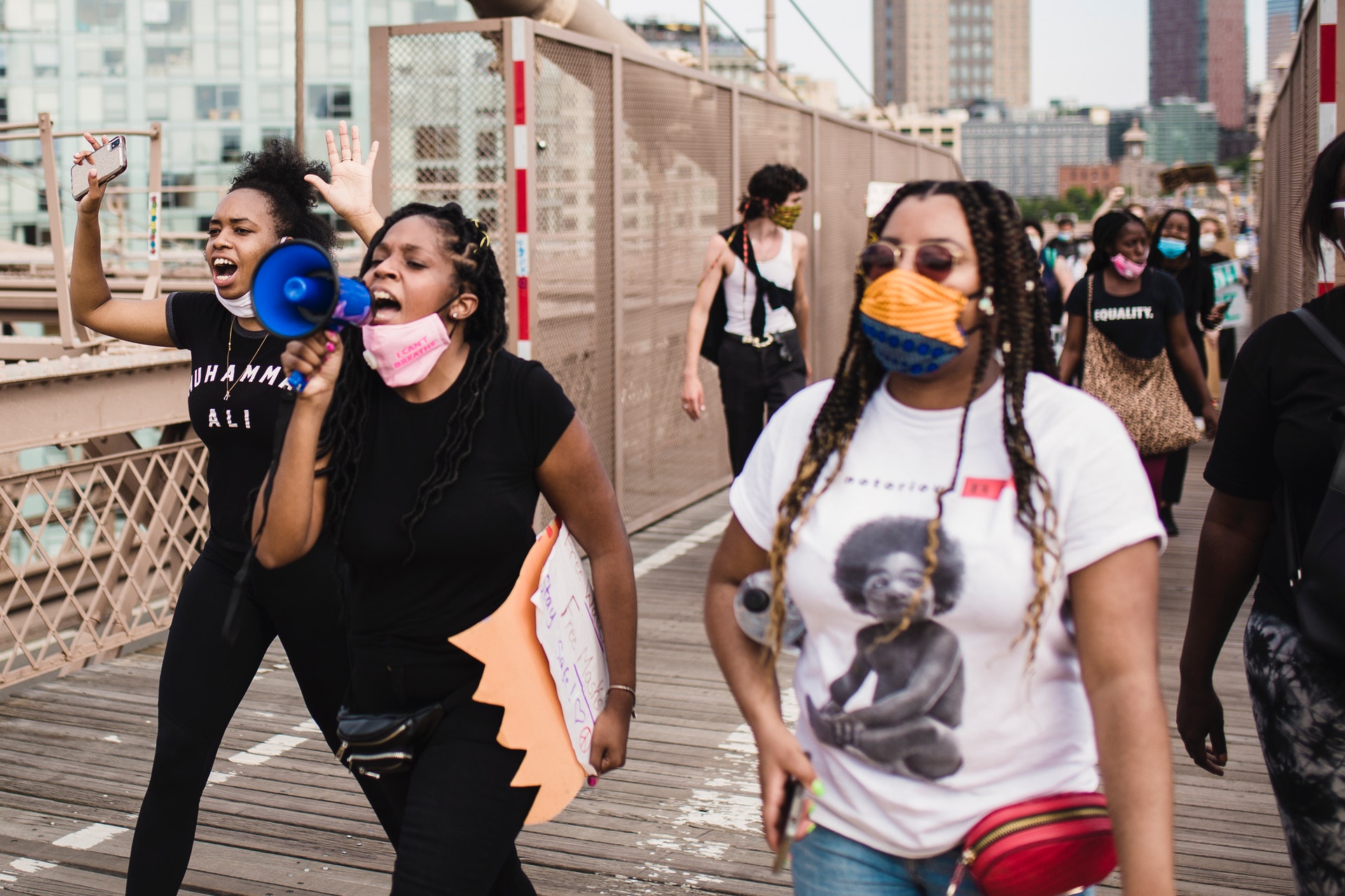The Dying Art of Civic Discourse

By Erin McIntosh
Staff Writer
1/7/2020

Black Lives Matter protestors
Earlier this month, J. K. Rowling published an essay on her personal website on transgenderism. In it, she recognized biological sex as a scientific reality and expressed deep concerns about the effect the trans rights movement and its denial of biological sex is having on education and the safety and welfare of women and children. Her essay was thoughtful and rational, sincere in its attempts to start a dialogue on this issue, and drew on Rowling’s own experiences as a survivor of domestic abuse and her charity work. For her trouble, she was attacked by a Twitter mob, branded a “transphobe,” condemned by a slew of celebrities, including Harry Potter stars, and repeatedly told to “shut the fuck up.” In her essay, Rowling called this an assumed “right” by her audience, the media, and the world-at-large, “to police my speech.”
Over the past month, there have been similar attacks on freedom of speech and conscience from the Black Lives Matter movement. The sentiment now, at least amongst liberals, seems to be that unless you’re a person with direct experience of the issue, i.e. unless you’re black, you shouldn’t bother adding anything new to the conversation. Then again, if you don’t engage at all, you’ll be condemned for not being supportive of the movement because “Your silence is complicity.” The safest thing is to uncritically regurgitate trending slogans, and loudly, although you’ll still risk being decried as performative, and as not doing enough. Even if you’re black, you should still follow the popular orthodoxy, unless you want to be labeled an “Uncle Tom” and told you need to “escape from the plantation.” Indeed, the sister of one of my friends has been verbally abused and labeled a “traitor” for being both black and a cop.

It’s gotten to the point where people with different views are only speaking out anonymously, like the anonymous UC Berkeley professor who sent a letter to other faculty members articulating a differing, and frequently critical, view of the current racial climate along with the university’s response to it. In it, the author questioned the fixation on white supremacy and white systemic racism as the sole reason for the problems in the black community in Berkeley’s communiqués. He also worried “that writing this email publicly might lead to me losing my job, and likely all future jobs in my field.” The fear wasn’t far-fetched: the university’s response was to condemn the letter in a tweet that accused it of “going against our commitment to equality and inclusion,” without any attempt to address the concerns in it. The political philosopher John Stuart Mill had a term for a climate like this. He called it the “tyranny of the majority,” which he described as “a social tyranny more formidable than many kinds of political oppression…enslaving the soul itself.”
We live in a time when many people’s first instinct is to call for the censorship or cancellation of people they disagree with. Views are instantly deemed either right or wrong, or good or bad. The willingness to have a nuanced conversation about an issue has all but disappeared. In an article critiquing the current state of the American press, Matt Taibbi wrote that leaders “are replacing traditional liberal beliefs about tolerance, free inquiry, and even racial harmony with ideas…that eschew debate, moving straight to shaming, threats, and intimidation.” What we refer to now as “debates” have devolved into ad hominem spitting matches where one side tries to deride and humiliate the other.
Black Lives Matter protestors boo and heckle Jacob Frey, Mayor of Minneapolis, when he refuses to defund the Minneapolis Police Department
We’ve seen what happens when a person or group of people feels voiceless, so why do we think the antidote to uplifting those voices is the exclusion of others? And, as if it wasn’t bad enough to call for the exclusion of others’ opinions because we disagree with them, many of us call for their exclusion on the basis of the speaker’s identity, in direct violation of Martin Luther King’s exhortation to judge people “not by the color of their skin, but by the content of their character.”
When we shut ourselves off from different people or different opinions, we create echo chambers around ourselves. Today, it’s easier than ever to live in a vacuum of “likes” and retweets, to custom choose a virtual reality where all we see is a confirmation of our own values. “Each of us constructs a custom informational universe, wittingly (we choose to go to the sources that uphold our existing beliefs and thus flatter us) or unwittingly (our app algorithms do the driving for us),” wrote George Saunders in an article in The New Yorker. “The data we get this way, pre-imprinted with spin and mythos, are intensely one-dimensional.”
Ultimately, the ones we end up hurting most by doing this is ourselves. As Mill wrote in On Liberty: “The peculiar evil of silencing the expression of an opinion is, that it is robbing…those who dissent from the opinion still more than those who hold it. If the opinion is right, they are deprived of the opportunity of exchanging error for truth: if wrong, they lose what is almost as great a benefit, the clearer perception and livelier impression of truth, produced by its collision with error.”
Ultimately, the ones we end up hurting most by staying in echo chambers is ourselves.
How do we escape from this trap? In his article, Saunders recounted his efforts to talk with Trump supporters before the 2016 election, people with whom he largely disagreed. One of his tactics was to describe to them a hypothetical person who might suffer as a result of Trump’s promised policies, and he wrote that this was always met with thoughtfulness: “My interviewees began trying, really trying, to think of what would be fairest and most humane. It wasn’t that we suddenly agreed, but the tone changed. We popped briefly out of zinger mode and began to have some faith in one another, a shared confidence that if we talked long enough, respectfully enough, a solution could be found that might satisfy our respective best notions of who we were.”
I can’t help but wonder, in the face of so much upset on one hand and virtue signaling on the other, how many of those who are outraged have taken the time to speak to someone on the other side of the fence, or even in the middle?
How many of those who are outraged have taken the time to speak to someone on the other side of the fence, or even in the middle?
Documentary filmmaker Deeyah Khan (whose films include White Right: Meeting the Enemy and Jihad: A Story of the Others) made it her mission to have conversations with those she’d grown tired of hating and being hated by. She explained in an interview with Vox that before this, she’d tried every other kind of response: “being angry at racists, shouting at them, confronting them, protesting against them, self-righteously shunning them.” But none of those approaches seemed to create any real change, and so she tried reaching out to these extremists — both white supremacists and jihadists – and speaking with them instead.

Deeyah Khan (Picture Credit: Anders Henrikson)
One of her most surprising encounters was with Jeff Schoep, a leader of America’s largest neo-Nazi organization and a one-time Klan member. Khan described him as “one of the most extreme people I met.” By the end of their time together, though, he shocked her by telling her of his plan to leave his old life behind. Schoep credited his decision to the “dialogue and conversation” the two of them shared, going so far as to call Khan his “friend.” Khan came out of the process feeling differently, too, filled with understanding and empathy for the pain that drives these men and fuels their beliefs. “There’s always something to learn from people,” she said, “and there’s always going to be some point of human connection.” In an article in New York Magazine, Andrew Sullivan described the willingness to engage as the essence of liberalism. Liberalism, he wrote, is “a spirit that seeks moral clarity but understands that this is very hard, that life and history are complex…a spirit that deals with an argument — and not a person — and that counters that argument with logic, not abuse…it’s generous, humorous, and graceful in its love of argument and debate.”
Tribalism and groupthink may be natural parts of the human condition, but we don’t need to let them mentally handicap us. “Unlike any other creature on this planet, humans can learn and understand, without having experienced. They can think themselves into other people’s places.”
Who said that? J. K. Rowling did, speaking about the power of imagination and empathy at Harvard’s 2008 commencement. “Choosing to live in narrow spaces leads to a form of mental agoraphobia,” she warned, “and that brings its own terrors. I think the willfully unimaginative see more monsters. They are often more afraid.”

J. K. Rowling
Right now, some might say this quote applies to its speaker. And maybe it does. But when will we stop to consider that it goes both ways? If we refuse to see nuance, and respond out of fear — fear of being ostracized, or fear of being wrong — we become unable to respond with respect and understanding. At the end of her essay, Rowling asked simply to be heard, and to be treated with decency. Don’t we all wish for that? It’s only by showing others a modicum of civility that we can hope to understand their perspectives, get closer to the truth, and begin to improve ourselves and our societies.
